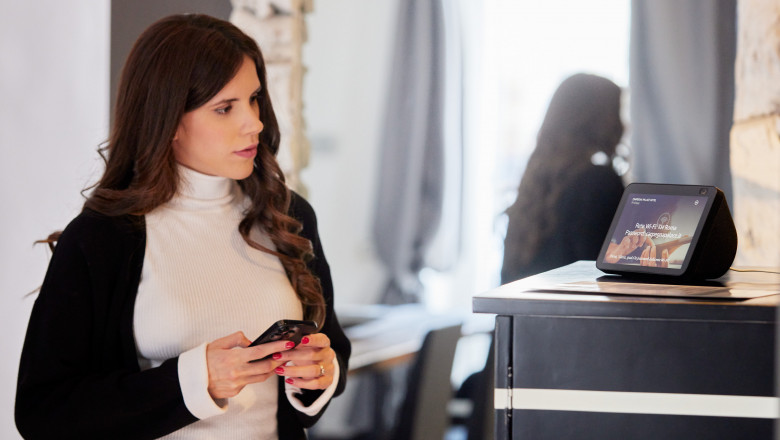views
The introduction of Alexa hospitality into hotels has sparked concerns among workers. Will technology replace jobs in the hospitality industry? It’s a valid question, but the answer is clear: no.
Tools like Alexa smart properties are not here to eliminate jobs. They’re designed to make work easier and help staff focus on what they do best: creating amazing guest experiences.
This article will explore how Alexa works, why jobs are safe, and how this technology can enhance hospitality.
What Does Alexa Hospitality Do?
Alexa hospitality is designed to handle repetitive, everyday tasks that don’t require a human touch. For example:
- Guests can ask Alexa common questions like “What time is checkout?” or “How do I adjust the thermostat?”
- Guests can request room service or housekeeping directly through the device.
- Room settings, such as lighting and temperature, can be controlled by voice commands.
These tasks are simple but time-consuming. By automating them, Alexa smart properties allow hotel staff to focus on more important duties.
The Importance of the Human Touch
Technology can help, but it can’t replace what makes hospitality special—the personal touch.
Guests still value:
- A warm greeting at the front desk.
- A handwritten welcome note or a small gift in their room.
- Personalized recommendations from staff who know the area.
For example, a guest might ask Alexa to send a towel, but the smile and care from the staff member delivering it make the experience memorable. No device can replicate the human warmth that defines great hospitality.
How Alexa Hospitality Makes Jobs Easier
Instead of replacing workers, Alexa hospitality helps them be more efficient.
Here’s how:
- Housekeeping: Instead of taking calls or notes, staff receive instant notifications for requests like extra pillows or fresh towels.
- Room Service: Orders come directly through Alexa, allowing the kitchen and delivery staff to plan and execute smoothly.
- Front Desk Staff: Alexa handles basic questions, giving staff more time to assist with complex guest needs, such as resolving issues or providing personalized recommendations.
This means less stress for workers and faster service for guests. It’s a win-win.
Job Roles Will Adapt, Not Disappear
While Alexa won’t replace jobs, it might change some roles. Workers may need to adapt by learning new skills, such as managing and maintaining Alexa smart properties systems.
For example:
- IT teams may take on new responsibilities, like system troubleshooting and updates.
- Staff might receive training to use Alexa’s data insights to enhance guest services.
- Concierge staff may use Alexa to streamline information delivery while focusing on building relationships with guests.
These changes create opportunities for growth and learning, not job loss.
Enhancing the Guest Experience
Guests expect fast, seamless service, and Alexa Smart Properties deliver that. Alexa improves convenience without taking away the personal elements of hospitality.
For example:
- Guests can adjust their room settings instantly, improving comfort without needing to call staff.
- Alexa can recommend hotel services or nearby attractions, enhancing the guest experience.
- Requests are routed to the right department instantly, ensuring faster service.
While Alexa provides efficiency, the personal connection between guests and staff remains central to the hospitality experience.
Addressing the Fear of Technology
It’s natural to worry about how new technology will affect jobs. This concern isn’t unique to hospitality—it happens in every industry when new tools are introduced.
History shows that technology doesn’t replace people; it helps them work smarter. Computers didn’t eliminate front desk staff—they made it easier to manage bookings and guest records. Similarly, alexa hospitality is a tool to enhance, not erase, roles in the hospitality industry.
The Bigger Picture
As tools like Alexa smart properties become more common, hotels may prioritize hiring tech-savvy staff or offering training to current employees. This is part of a broader trend across many industries where technology complements human work rather than replacing it.
Hotels that embrace Alexa gain a competitive edge. They can provide faster, more efficient service while allowing staff to focus on creating meaningful guest experiences.
Final Thoughts
So, will Alexa hospitality replace jobs? No. It’s here to help, not take over.
Tools like Alexa smart properties automate simple tasks, making work easier for staff and improving service for guests. However, they can’t replace the warmth of a smile, the thoughtfulness of a handwritten note, or the care that comes with human interaction.
In hospitality, the personal touch will always matter most. Alexa is just a tool to help staff shine brighter in what they already do best—making guests feel welcome.






















Comments
0 comment